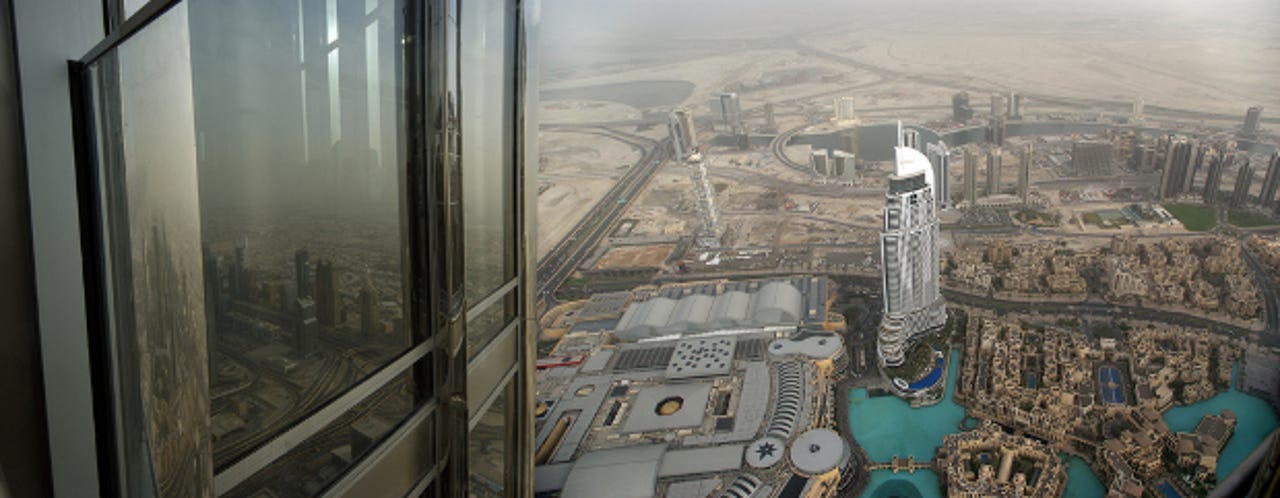Dubai thinks big with plan to turn itself into a wi-fi connected smart city


Dubai has ambitions to be a connected smart city.
Its 'connectedness' has made huge progress over the past six years. When I arrived, I found myself subscribing at home to a 512Kbps internet connection because, at around the equivalent of £50 a month, I simply wasn't prepared to pay for a 1Mbps line.
Now, although prices are still high in comparison to the UK, I have an 8Mbps line and a fibre to the home connection, and pay less than I was for 512kbps. If I arrived today from the UK, I have no idea if, digitally, I'd feel like I was stepping back in time, as I did when I first got here, because I have been out of the country for too long. I know I have no choice of provider, but otherwise, it feels like progress has been rapid.
The same can be said for the range of government services now online. On arrival, to pay bills such as phone or electricity (both state-run), I'd make a trip to one of their local offices, take a ticket, find a seat and wait. Now of course these, and most other services, such as paying traffic fines, recharging the RFID-based road tolls, renewing car registration, are accessed via user-friendly websites.
The same has been happening for mobile payments. A range of services have been launched over the past couple of years, such as the ability to use your mobile for m-parking, rather than having to feed coins into a meter.
Again, when you have lived through the change, it feels like progress has been fast.
Rapid changes
This week, Dubai hosts Gitex, the largest technology exhibition and conference in the Middle East. It means there will be a raft of announcements, not so much by the big technology companies, which don't tend to launch products here, but by service providers.
Especially active over the last few days has been the government, as it drives forwards its public services ambitions.
Its biggest announcement is a project being driven by Dubai's ruling Sheikh, Mohammed bin Rashid Al Maktoum, and called Dubai Smart City. He wants pervasive wireless across the city. In a series of tweets, he said: "We launched a new project to transform Dubai into a smart city. Education, healthcare and general security will be managed via smart systems. The project aims to provide all Dubai residents with high-speed internet in public places, and live services and information."
The project will be executed over a number of phases and is being overseen by one of the Sheikh's sons, Crown Prince Hamdan bin Mohammed. It will enable people to use government services online, in particular to manage education, healthcare and security via smart systems, whenever and wherever they are in Dubai.
It will be achieved via sensors placed throughout the city, although plans are in their early stages, so no indication has been given on what technology will underpin it or if the service will be free. There will also be access to sites run by airlines, shopping malls, restaurants, hotels and banks, although it is not clear yet whether the hotspots will allow for open internet access.
A whole city wirelessly connected for free to the internet is an ambitious project and it will be interesting to see if this extends beyond the urbanised areas into the desert and sparsely populated areas. The difference today when a government talks about connected cities compared to over the past decade is that many citizens are now connected, due to the proliferation of 3G. But in this instance, Dubai is really targeting an anytime, anywhere model for its services, and giving people the choice of accessing them without chewing up their data packages.
Online government services have been pushed in past years at Gitex, but now there is a coherence and more obvious usefulness to the services being promoted.
More apps
Dubai Electricity and Water Authority (Dewa) is showing its new app at Gitex, aimed at making it easier to use its various services. This may not seem significant, but as anyone who lives here will tell you, dealings with the authority can be slow and bureaucratic, particularly when trying to open or close an account at a household address.
Services on offer via the app include using augmented reality to locate its offices, the ability to handle requests for final settlements when moving out of a property, for new connections when moving to a new address and for temporary connections — weddings being one example cited.
Dewa's app is in line with the emirate's Smart Government initiative and again, part of the anytime, anywhere model.
As is the app being launched by Dubai Taxi Corporation, a subsidiary of the government's Roads and Transport Authority (RTA).
Smart Taxi is a real-time service that, upon booking, knows your location and can be used to track the whereabouts of your ride as it finds its way to you. The app allows "clients to book taxis and directly track their path until their arrival in a real-time exercise", Mattar Al Tayer, chairman of RTA, told Gulf News.
The attraction of this app to residents is the location feature. Despite all taxis having GPS systems on their dashboards, the language barrier never seems bigger than when struggling to direct a taxi to your home or present location, so bookings via the app are an attractive option if it works as described.
Finally, state-run telco Etisalat has used Gitex to push online education. It is working with the UAE's Ministry of Education and Google to use YouTube as an outlet. The free video lessons, in Arabic, are the telco says, designed to ease the burden of private tuition and aimed at children in school years 11 and 12. Lessons for other age groups will also be added.
Earlier this week, the first lesson was posted on the Duroosi (Arabic for my studies or learning), a 25 minute chemistry lesson. The channel will eventually host video tutorials across a range of subjects in the partnership's own version of a massive open online course.
Dubai likes to think big with its projects, as can be seen through the rapid development of the city and its efforts to build world firsts, such as its man-made Palm Jumeirah palm-tree shaped island the 830m-high Burj Khalifa. Its efforts to create the connected city are a similar move to think big with technology. As Sheikh Mohammed tweeted yesterday: "Technology is there to make people's life happier and easier, and we won't save an effort to achieve this purpose."